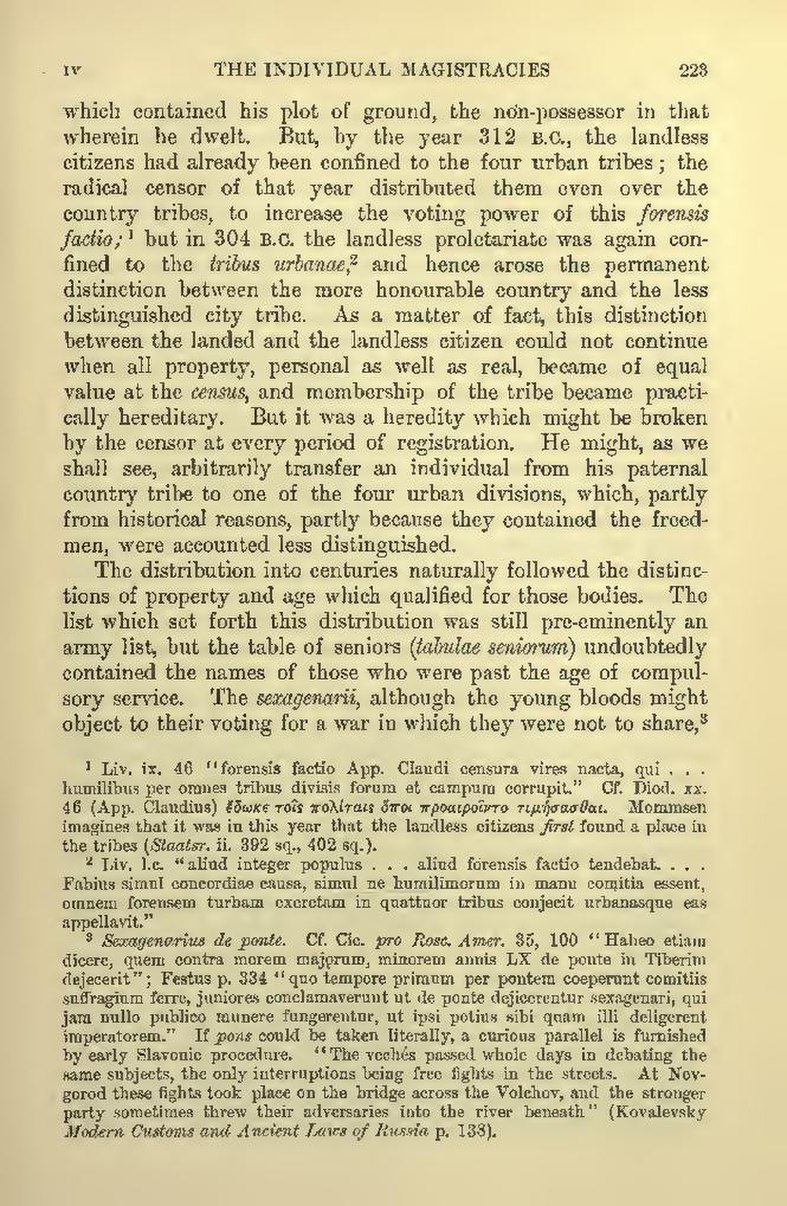which contained his plot of ground, the non-possessor in that wherein he dwelt. But, by the year 312 B.C., the landless citizens had already been confined to the four urban tribes; the radical censor of that year distributed them even over the country tribes, to increase the voting power of this forensis factio;[1] but in 304 B.c. the landless proletariate was again confined to the tribus urbanae,[2] and hence arose the permanent distinction between the more honourable country and the less distinguished city tribe. As a matter of fact, this distinction between the landed and the landless citizen could not continue when all property, personal as well as real, became of equal value at the census, and membership of the tribe became practically hereditary. But it was a heredity which might be broken by the censor at every period of registration. He might, as we shall see, arbitrarily transfer an individual from his paternal country tribe to one of the four urban divisions, which, partly from historical reasons, partly because they contained the freedmen, were accounted less distinguished.
The distribution into centuries naturally followed the distinctions of property and age which qualified for those bodies. The list which set forth this distribution was still pre-eminently an army list, but the table of seniors (tabulae seniorum) undoubtedly contained the names of those who were past the age of compulsory service. The sexagenarii, although the young bloods might object to their voting for a war in which they were not to share,[3]. Mommsen imagines that it was in this year that the landless citizens first found a place in the tribes (Staatsr. ii. 392 sq., 402 sq.).]
- ↑ Liv. ix. 46 "forensis factio App. Claudi censura vires nacta, qui . . . humilibus per omnes tribus divisis forum et campum corrupit." Cf. Diod. xx. 46 (App. Claudius) [Greek: edôke tois politais hopoi proairointo timêsasthai
- ↑ Liv. l.c. "aliud integer populus . . . aliud forensis factio tendebat. . . . Fabius simul concordiae causa, simul ne humilimorum in manu comitia essent, omnem forensem turbam excretam in quattuor tribus conjecit urbanasque eas appellavit."
- ↑ Sexagenarius de ponte. Cf. Cic. pro Rosc. Amer. 35, 100 "Habeo etiam dicere, quem contra morem majorum, minorem annis LX de ponte in Tiberim dejecerit"; Festus p. 334 "quo tempore primum per pontem coeperunt comitiis suffragium ferre, juniores conclamaverunt ut de ponte dejicerentur sexagenari, qui jam nullo publico munere fungerentur, ut ipsi potius sibi quam illi deligerent imperatorem." If pons could be taken literally, a curious parallel is furnished by early Slavonic procedure. "The vechés passed whole days in debating the same subjects, the only interruptions being free fights in the streets. At Novgorod these fights took place on the bridge across the Volchov, and the stronger party sometimes threw their adversaries into the river beneath" (Kovalevsky Modern Customs and Ancient Laws of Russia p. 138).
